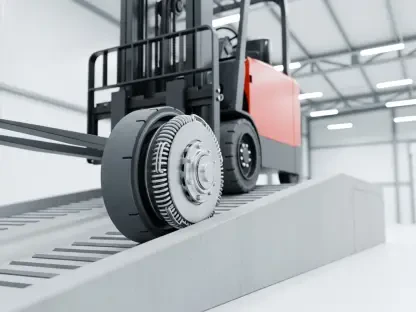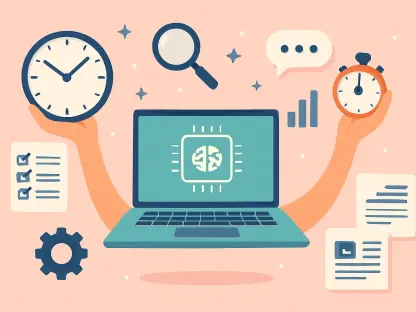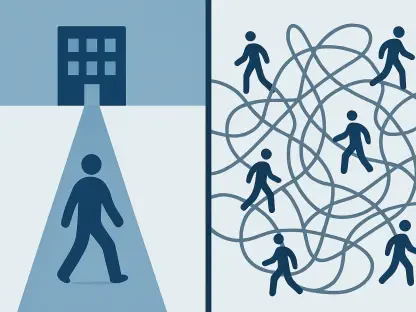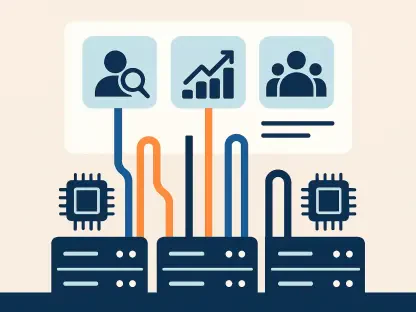The application of artificial intelligence (AI) within human resources has evolved from nascent innovation into a transformative force reshaping the HR landscape, promising significant improvements in efficiency and effectiveness. Faced with increasingly complex HR operations needing speed, customization, and adaptability, organizations are turning to AI to streamline processes. This technology review delves into the complexities of AI HR integration, evaluating its core features, expressing the latest advancements, and scrutinizing real-world applications across diverse sectors. The aim is to understand how AI has revolutionized HR functions and to predict how it may further evolve.
Exploring AI’s Role in HR Transformation
AI technologies were once confined to tech labs, but today, they’re deeply embedded in everyday HR operations. Their emergence and integration in HR are not merely passing trends but rather integral shifts that have transformed traditional models of employee management and organizational productivity. By utilizing machine learning, natural language processing, and data analytics, AI tools can manage an array of HR functions, from recruitment to employee evaluation. Understanding the contextual framework within which AI operates elucidates its significance as part of an advanced tech ecosystem, aligning with the broader trajectory of digital transformation across industries.
Key Features and Components of AI in HR
AI-Powered HR Assistants
AI-powered HR assistants, including chatbots and virtual companions, have emerged as indispensable tools in HR departments, revolutionizing traditional avenues of employee interaction and support. These digital assistants offer a level of efficiency and precision that manual processes often cannot guarantee. They handle routine inquiries, automate repetitive tasks, and provide real-time assistance, enabling HR personnel to focus on more strategic functions. Their ability to offer personalized, context-aware responses means they can tailor support to diverse business needs and cultural nuances, cementing their role as valuable assets in HR operations.
Data Analytics and Enhanced Decision-Making
With the deployment of sophisticated AI algorithms, HR departments have redefined business intelligence and strategy formulation in HR management. These systems analyze vast datasets to provide actionable insights, enhancing decision-making capabilities significantly. AI-driven analytics can identify trends, predict future behaviors, and efficiently match candidates with job requirements, optimizing the recruitment process. Such data-enabled decision-making frameworks not only improve efficiency but also empower organizations to harness predictive analytics for better workforce planning and resource allocation.
Recent Developments and Innovations in AI HR
Recent years have seen an array of innovative developments in AI HR technology, characterized by increasingly sophisticated and personalized AI solutions. Advanced AI systems now possess the capability to understand context, emotion, and nuanced human communication, facilitating better interaction and user experience. The emerging trend includes greater integration with enterprise software, creating seamless platforms that enhance productivity and service delivery. This evolution underscores a shift in industry attitudes, from resistance to enthusiastic adoption, as organizations recognize the transformative potential of AI-driven HR innovations.
Real-World Applications Across Different Sectors
Across industries, AI applications in human resources illustrate groundbreaking changes in how organizations manage talent and operations. Unique use cases abound, from seamless onboarding and personalized training programs to predictive performance evaluations and personalized career pathing. Different sectors have tailored AI solutions to align with specific challenges, such as healthcare organizations leveraging AI to manage complex shift scheduling or tech companies optimizing their recruitment pipelines. These case studies exemplify AI’s adaptability and effectiveness, showcasing how diverse sectors are reaping benefits from tailored AI integrations.
Addressing Challenges and Limitations in AI HR Adoption
The adoption of AI in HR isn’t without its challenges, ranging from technical constraints to regulatory hurdles and market resistance. Issues such as data privacy concerns, the complexity of integrating new technology with legacy systems, and skepticism around AI’s impact on job roles pose significant challenges. However, ongoing efforts focus on overcoming these obstacles, with industry leaders emphasizing transparency, robust data governance frameworks, and strategic partnerships as pathways to successful AI adoption. Organizations are actively addressing these concerns to pave the way for smoother integration.
Anticipating Future Developments in AI HR
The future of AI in HR holds potential breakthroughs, including more sophisticated AI solutions capable of running autonomous HR operations. With trends pointing toward even tighter integration with enterprise tools and cloud-based platforms, organizations can anticipate comprehensive systems that further streamline HR processes. Future AI innovations are expected to contribute to more strategic, empathy-driven HR departments, enhancing the human element while maintaining high efficiency. Long-term impacts may reshape entire industries, influencing how businesses attract, retain, and engage talent.
Concluding Insights: AI as a Catalyst in HR Evolution
In conclusion, the review illustrates how AI HR integration has grown beyond conventional functions, becoming a catalyst for innovation and efficiency in organizational ecosystems. The current state of AI in HR reflects not just a technological advancement but a paradigm shift within industries. As AI continues to evolve, organizations must strategically align their adoption efforts, recognizing AI as a vital collaborator in shaping the future of HR. The ongoing journey points toward AI’s broader impact, as it becomes an indispensable partner in navigating the ever-changing landscape of human resource management, bringing both challenges and opportunities into sharper focus.









